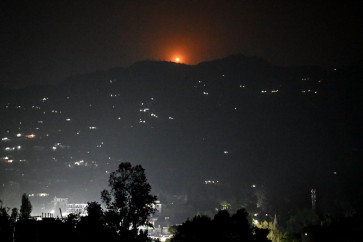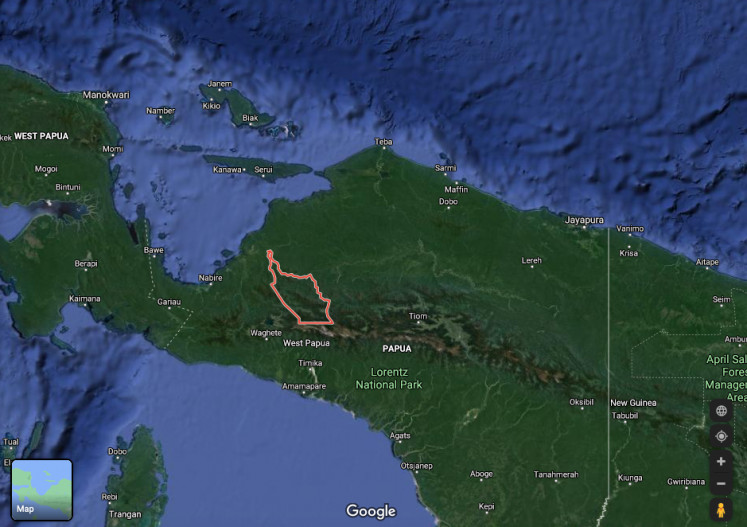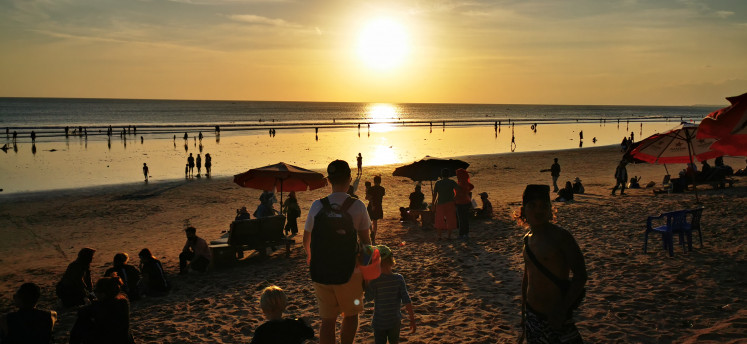GBK urban forest new oasis in heart of Jakarta
Urban paradise: A family enjoys the view of a miniature waterfall in Hutan Kota (Urban Forest) at the Gelora Bung Karno (GBK) sports complex in Senayan, Central Jakarta, on Sunday
Change text size
Gift Premium Articles
to Anyone

U
rban paradise: A family enjoys the view of a miniature waterfall in Hutan Kota (Urban Forest) at the Gelora Bung Karno (GBK) sports complex in Senayan, Central Jakarta, on Sunday.(JP/Seto Wardhana)
For Cynthia Dwi, 48, and her family, moving back to Jakarta after having lived in Surakarta, Central Java, for four years means no more forests, mountains and beaches to explore.
Seeking fresh air at the nearby Puncak in Bogor, West Java, a popular getaway among Jakartans, was not an option for her family as they considered the traffic congestion to be too time-consuming.
They had reached a dead-end looking for options to spend their leisure time beyond the mundane shopping malls scattered around the city.
“My children prefer outdoor activities. Since we moved back to Jakarta, though, they have had no other choice than to shop, as all we have here are malls,” Cynthia said.
However, as open green spaces in Jakarta have seen expansions recently following the city’s effort to allocate 30 percent of its land for such spaces, Cynthia said she had begun to see more alternative destinations. Those include the Gelora Bung Karno urban forest in South Jakarta, where she has been a frequent visitor since renovations were completed last year.
An oasis among the high-rise buildings, the urban forest is located within the Gelora Bung Karno (GBK) sports complex, right by Gate 7, across from its east-wing parking lot and alongside Jl. Sudirman of South Jakarta, one of the city’s main thoroughfares.
The 4.6 hectare urban forest was built as part of the GBK revamp ahead of the 2018 Asian Games held in the capital, replacing a commercial golf driving range.
“The urban forest is an alternative destination. It doesn’t cost much as we only need to pay for the parking fees to visit,” Cynthia told The Jakarta Post at the GBK urban forest on Saturday.
Yet to be officially launched, the urban forest is already open for visitors. Although the planted trees have yet to grow, grass covers the area and it is crossed by pedestrian pathways.
A pond has been built in the eastern section of the forest, near six currently vacant kiosks. Not far away, several wooden benches stand on a small hill, overlooking an oval stage — an arrangement, which resembles an amphitheater.
Fishponds with a small cascading waterfall are located at the center of the forest, with another amphitheater located nearby. A large building resembling a house is the centerpiece of the park, while other facilities such as dressing rooms and toilets, all of which are still closed for the public, have also been built.
The president director of GBK sports complex management Winarto said the urban forest would be officially launched in August. The public facilities would be opened then, he said.
“The building in the center will be made into a premium dining restaurant by a private company, selling Indonesian cuisine for middle-upper class visitors, while the kiosks will also sell food and beverages for the middle to lower class visitors,” he told the Post.
He added that live performances would also be staged at the amphitheater, showcasing a variety of Indonesian cultures.
The park, he said, could be easily reached by MRT when the nearby underground Senayan MRT Station on Jl. Sudirman opened in March.
“The GBK urban forest is expected to become a gallery of Indonesia,” he said.
Aris Gunawan, 33, who was taking an afternoon stroll with his toddler-aged son in the park, expressed his appreciation, describing the urban forest as an upgraded version of the green spaces and child-friendly public places commonly spotted around the city.
“Now it is up to the visitors to take care of the forest, as I saw people stepping on the grass earlier,” he said.
Another visitor, Ira Dzakira, 25, said similar spaces should be built on the city’s outskirts, where children are often in danger by playing on the streets.
“Such forests should be built around residential areas on the outskirts as children there have lost their playgrounds,” she said. (ars)









